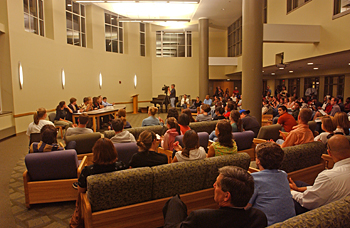CALR is part of a network of college student organizations that works to increase youth leadership and advance positive social change on university campuses, in Latino communities and throughout the United States.
The meeting was called after CALR, Phi Sigma Pi, a coeducational national honor fraternity, some of whose members attended the party in their personal capacity, and other student organizations denounced a racial slur and stereotypical depiction of the Latino community at the party.
In response to the incident, UD President David P. Roselle issued a statement to the University community reiterating that UD “must be a diverse and supportive community that provides a safe and hospitable environment for all students, faculty and staff, without regard to racial and ethnic background, religious beliefs or sexual orientation.”
Jissell Martinez, a junior international relations major and president of CALR, told the standing-room-only audience that the meeting was organized jointly by CALR and Phi Sigma Pi in an effort to begin the healing process in an informal and interactive way that would examine the deeper issues surrounding the actions at the party.
Martinez said that representatives of CALR had met separately with Roselle and officials of Phi Sigma Pi. She added that while CALR has accepted a decision by the University administration that no judicial action would be taken against any of the students involved because there were no violations of University policy, the honor society and the individuals involved need to take corrective action.
“As a community, we need to embrace those who offended us and come together to ensure that something like this never happens again,” Martinez said.
Sitting next to Martinez, Lauren Boroski, a sophomore biological sciences major and a member of Phi Sigma Pi who attended the party, drew applause after she apologized and pledged to make up for her mistake by working to promote better relations among students. Martinez and Boroski concluded the meeting with an embrace.
“I felt that people understood that I didn't do it in a malicious way. I am trying to really rectify things and really make it better, and I hope that people are going to be with me on that mission,” Boroski, whose parents, Maria and Brendan Boroski, attended the meeting to support her effort to make amends, said. “I felt that I needed to address the situation. I didn't want to run. I had nothing to hide. I feel a lot better.”
Jacqueline Rodriguez, a senior criminal justice major, said the meeting was necessary and useful to all members of the University community.
“As a Latina, I was very offended by what happened and this is definitely a good start. They didn't condemn the students, they more embraced them,” Rodriguez said of the students who spoke at the meeting. “It was very open and comfortable and the offending parties would not feel like they were being talked down to. It was a mature discussion.”
During the meeting, students made proposals on how to educate and sensitize the University community on racial issues. Among the suggestions were events organized jointly by different student organizations, a multi-ethnic music concert and racial sensitivity training for members of the faculty.
Justin Melis, a junior criminal justice major and programming director for CALR who opened the discussion with a caution against debate and confrontational or rowdy remarks, said the decorum at the meeting was a reflection of the maturity of the student body.
“We wanted to take a very proactive approach,” Melis said. “We knew that members of this community were very upset, and they didn't get a clear picture of what happened. The main goal here was to educate the community on what happened and ask for suggestions on how we can prevent this from happening in the future.”
Article by Martin Mbugua
Photo by Duane Perry



